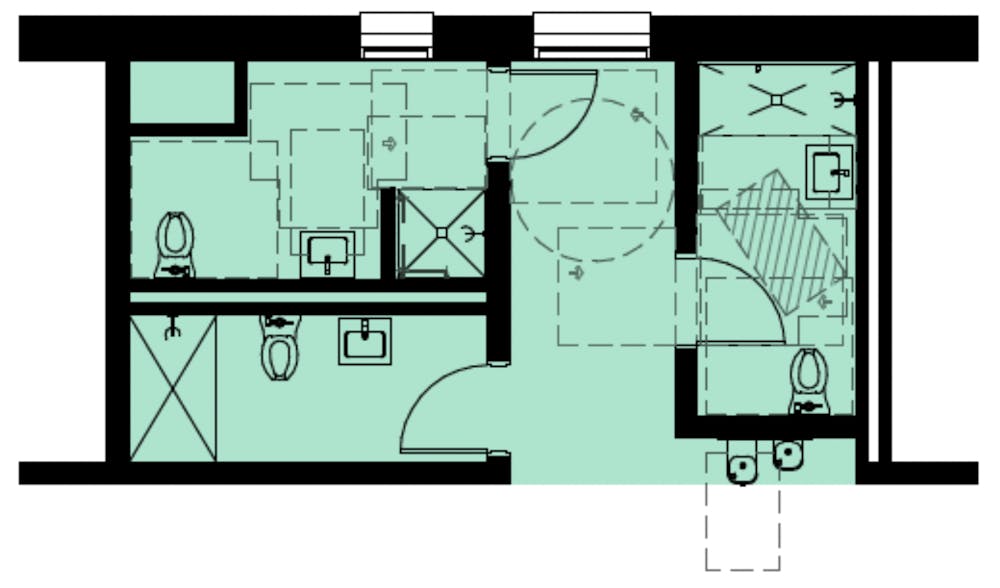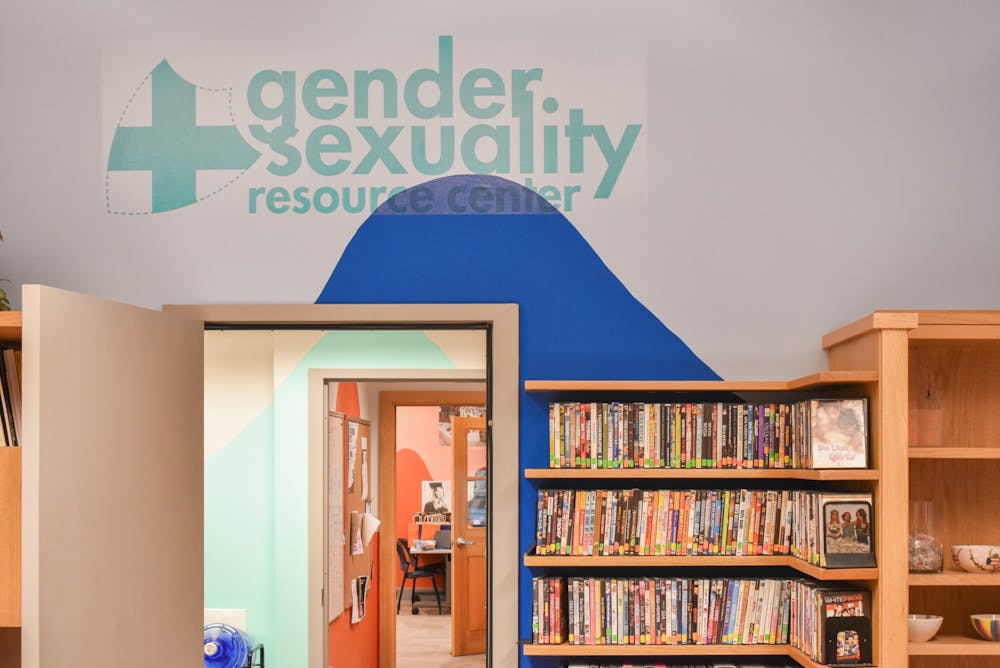For months, student organizers with the Princeton Pride Alliance said they’ve struggled to navigate the process for helping fellow queer students obtain gender-inclusive housing accommodations on campus.
Now, The Daily Princetonian has learned that new dorms in New College East (NCE), New College West (NCW), and Hobson College have been designed to include gender-neutral restroom facilities. And a University spokesperson said that the University has taken a number of steps over the last few years toward gender-inclusive housing, including converting some bathrooms in older buildings to gender-neutral ones. But for some directly impacted students who spoke with the ‘Prince,’ the University’s efforts have felt insufficient.
NCE, NCW, and Hobson College will include two types of gender-inclusive restroom facilities.
“One type features a central room with sinks and mirrors. Off that room are two shower compartments, two toilet compartments, and one room with a toilet, lavatory and shower. Each compartment has a door and full-height partitions,” wrote Deputy University Spokesperson Michael Hotchkiss in an email to the ‘Prince.’

“The second type of restroom features an individual room equipped with a toilet, sink and shower,” he added.


In his email, Hotchkiss wrote that “all housing on campus has been gender-neutral since 2016.” He added that, since 2014, approximately 250 bathrooms on campus have been converted to gender-inclusive spaces.
Since 2010, returning undergraduate and graduate students have been able to select roommates and rooms without regard to gender. Hotchkiss also clarified that entering first-years, undergraduates, and graduate students can make requests for gender-inclusive housing during in the housing application process, room draw, and throughout the year.
To be inclusive of transgender, non-binary, and gender-non-conforming students, Housing Services and the Gender + Sexuality Resource Center (GSRC) has created a “Bathroom Accommodation Pre-Draw Form” for students to be given a room and bathroom assignment that may be more gender-inclusive than assignments based on a student’s sex assigned at birth.

The ‘Prince’ reached out to leaders of the Pride Alliance, a student organization devoted to advocacy for queer students, to hear their perspectives and experiences in receiving housing and restroom accommodations.
Kristal Grant ’24 and Max Jakobsen ’24, the group’s co-leaders, told the ‘Prince’ that queer students have found the process of obtaining such accommodations “confusing” and “difficult-to-navigate” process. Grant and Jakobsen explained that after stepping into their roles at the helm of the Pride Alliance last spring, they received many reports from students and friends that obtaining accommodations has been difficult.
According to Grant, pre-draw bathroom accommodations are for students requesting accommodations on a “non-medical” basis, such as for students seeking gender-affirming bathrooms. During the process, students can explain why they have a need for a particular style of bathroom, whether it be a bathroom adjacent to a bedroom or a single stall option in the hallway.
Grant is an opinion editor emerita for the ‘Prince.’
In a meeting with the University Student Life Committee last fall, Jakobsen and Grant said raised issues to the committee of a lack of communication between the University and students, poor explanations on the difference between medical accommodations and pre-draw bathroom accommodations, and general stress around the process.
In an email to the ‘Prince,’ Grant wrote that she and Jakobsen “didn’t receive much of a response from the committee,” besides a few people who came up to them after the presentation to thank them for their organizing efforts.
“We’re both very skeptical of these committees and understand that they often serve as delay tactics to prevent real structural change and to protect these larger systems that Princeton exists within and benefits from,” Grant wrote.
According to Jakobsen, one of the biggest issues for students with the pre-draw bathroom form and accommodation application process has been that many are “just unaware and very confused about what accommodations [are] available to them and also what the deadlines were.”
“For those that did apply, they still had very difficult issues getting [accommodations],” Jakobsen said. “Applying and never getting a response from housing, applying and getting rejected after submitting an entire application describing your trauma.”
Part of the reason for this confusion, according to Grant, is the near lack of communication from the University about these opportunities.
“There was only one email that was sent out about accommodations on the basis of gender and that was the day before the application was due,” Grant added.
In February, Jakobsen and Grant met with Director of Housing Dorian Johnson to discuss these issues and formulate a plan to resolve them. The two students told the ‘Prince’ that Johnson seemed willing to work with students to address these issues.
According to the pair, many students didn’t understand that you needed to fill out an application for pre-draw bathroom accommodations. However, after Jakobsen and Grant met with Johnson and brought this issue to his attention, Johnson informally reopened the application.
He also directed Jakobsen and Grant to “have any students who feel like they’re having issues and need accommodations for bathroom for various reasons [to] apply,” Jakobsen said.
Jakobsen described these actions as “small victories,” for students, but said that the housing process remains “a very stressful process, a very difficult process.”
“Housing has been working in close partnership with the GSRC and LGBTQ+ student leadership to obtain feedback about the current Housing process,” Hotchkiss told the ‘Prince.’
But one student’s story of seeking gender-inclusive housing this academic year show the prolonged, complex, and emotionally draining experience that such a process has sometimes entailed.
Max Peel ’25 told the ‘Prince’ that when they first realized as an incoming first-year that they had been not been assigned gender-inclusive housing and instead assigned to a male roommate, “it became quite clear that Princeton viewed me as a man.”
Peel explained in an email to the ‘Prince’ that it was difficult to deal with the gender dysphoria that came as a result of the situation, on top of all of the other “academic, personal, and extracurricular stress” that they encountered in their first semester on campus. Peel said that they contacted Housing Services, but the office did not initially respond. They also said that their Director of Student Life (DSL) was “sympathetic,” but claimed that their residential college was “at capacity” in terms of housing. Peel then reached out to their Sexual Harassment / Assault Advising, Resources and Education (SHARE) therapist, who they said “advocated on [their] behalf.”
A few days after reaching out to their therapist and filling out a few new forms, Peel was temporarily moved to housing in McCosh Health Center, and later permanently moved to housing with a gender-inclusive restroom.
“I was given access to a single with a gender-inclusive restroom... I was also then given the pre-draw forms for applying for housing next year,” they wrote. “I got another single in [the same building] for my sophomore year.”
In the summer before their first fall semester, Peel said they felt confused by the housing forms.
“I found the forms very confusing and misleading and that partially contributed to why I was placed in my initial housing,” Peel wrote. “Housing has committed to do better with this next year, though. They’ve also promised to make it clearer for incoming first-year students what they need to do in order to access gender-inclusive accommodations.”
“The University needs to be more actively committed to modernizing the older residential colleges,” they added. “The University has emphasized its commitment to modernizing bathroom facilities on campus but provided absolutely no timescale for this which effectively allows them to delay this indefinitely.”
Peel also expressed their thanks to the Pride Alliance, specifically for the help they got from Jakobsen, Grant, and the SHARE office during their process of getting new housing.
For Grant, such cases of student struggles in obtaining gender-inclusive housing represent the broader disconnect between administrators and students in this process.
“It is important to highlight that this disconnect has been orchestrated. It didn’t just happen, this has been very intentional,” Grant said. “It’s because of the legacy of the school in general, these things are built into the school.”
Grant noted that a lot of the work that has been done in advocating for and advancing the interests of queer students on campus has been by the students themselves.
“When you look at the people who are being asked to do this unpaid labor, Max and I are both Black queer people,” they said. “It’s like we’re being asked to do a lot of this labor and it’s the University [that] needs to think about compensating people for this labor.”
But in the meantime, their efforts continue: Jakobsen and Grant plan to work with Housing Services in the near future to ensure that the language on housing forms is inclusive and accessible. And the pair stressed above all that they intend to support any queer students on campus who need assistance with the process.
“We are a resource to any queer and trans students who have questions about housing,” Jakobsen said. “Because of our personal experiences with housing, but also [we’re] supporting our community.”
Lia Opperman is an Assistant News Editor who often covers University affairs, student life, and local news. She can be reached at liaopperman@princeton.edu, on Instagram @liamariaaaa, or on Twitter @oppermanlia.
Brenden Garza is a news staff writer for the ‘Prince.’ He can be reached at bg8077@princeton.edu or @brenden.garza on Instagram.








